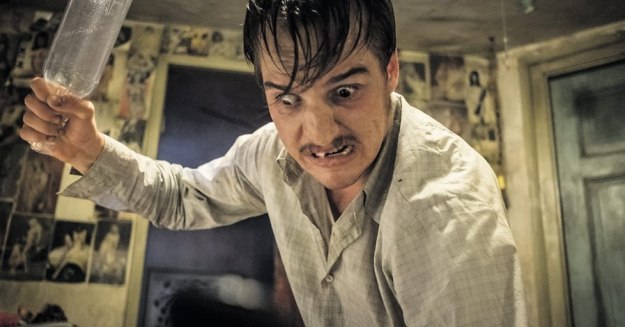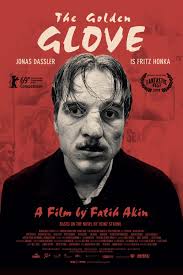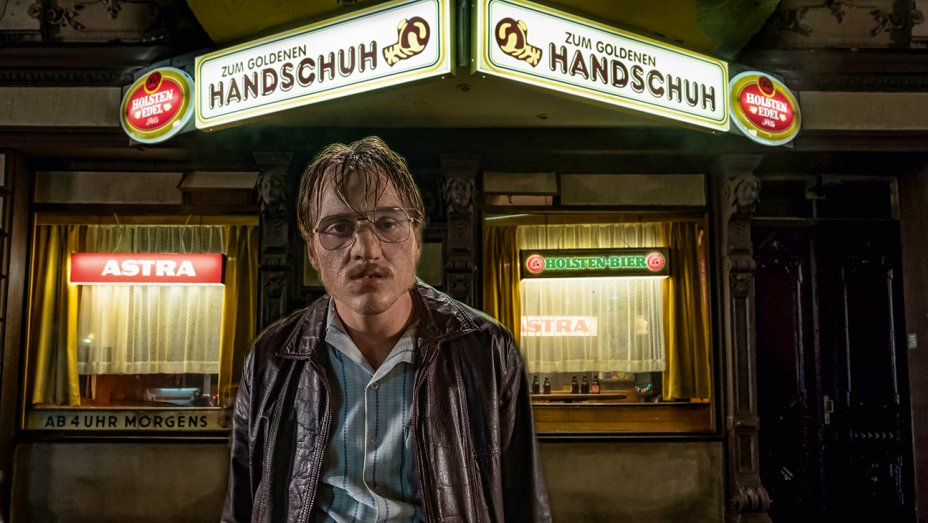
The opening scenes of any film are important in setting the style and tone of the film to follow; accepting this, the beginning of The Golden Glove rapidly establishes that what is to follow will be saturated with grime, misery and desperation, coming in immediately with largely intimated, but no less horrific violence. Based on a true story, the serial murders committed by Hamburg resident Fritz Honka during the 1970s, perhaps this film was never going to be able to represent that story without delving so fully into the misery and vulnerability of the red light district’s unfortunate inmates – but even so, The Golden Glove is a barely palatable foray into those crimes, a film which is very nearly void of any redemptive moments whatsoever. If this was director Fatih Akin’s aim, then bravo.
So in our opening scenes, there is already a woman lying dead in Honka’s ramshackle apartment. The suggestion is that he has lost his temper, leading to the woman’s death at his hands, and his predicament is simple: what does he do with the body? The camera pans away as he dismembers the corpse, stashing parts of it into black bags which he later dumps, whilst ominously, TV news reports state that parts of the woman’s body have not been found. Years move on, with Honka continuing to live his hand-to-mouth existence, harbouring malingering fantasies or clear contempt for the women who drift into his life, whilst daily drinking himself into a stupor in The Golden Glove of the title – a dive bar in the red light district, frequented by various oddballs and, for the most part, older women who are severely down on their luck. It is amongst these women that Honka usually spends his time, and – as downtrodden as they are – he sometimes convinces them to go home with him. Whilst murder is not necessarily his aim, he is without doubt a misogynist, and his treatment of Gerda Voss, for example – a lone woman who drifts into his life as a de facto housekeeper and sometime sexual target – is one of the toughest aspects of this film. I said that there are barely any redemptive moments in The Golden Glove; thank heavens there’s something approaching this where Gerda is concerned.

The Golden Glove would be pretty unpalatable on an audience-engagement level were it simply a run-through of murders, but instead, the film follows Honka as he makes some sort of an attempt to clean up his act, quitting the bottle at one point and endeavouring to break away from his dead-end job and deadbeat friends. It is during this section of the film that I found myself wondering if we are intended to feel any sort of sympathy for Honka here – as the film shows him almost handling a new role and new people, even turning into a shoulder to cry on. Perhaps seeing him humanised in this way makes it even more unpalatable. However, his fall from grace feels fairly inevitable when it comes, his behaviour and predilections ultimately inescapable. The performances are excellent. Jonas Dassler, in his prosthetics, is unrecognisable as himself and for such a young actor his rendition of a misshapen middle age man is quite something. He spins something incredibly dismal out of his role. Similarly, all the women here, with the exception of seen-from-afar schoolgirl, are shown at their absolute nadir – impoverished, dishevelled, sick with drink. The humanity they demonstrate in-role redeems the film from simply being a stalk-through the streets of Hamburg; the pace is more languid, giving enough time to really feel for the characters. Margarete Tiese and Martina Eitner-Acheampong in particular are superb (Eitner-Acheampong is able to assert herself, if momentarily – something which led to audible approval from the festival audience, which in turn reveals just how effectively repellent Dassler makes his own role.)
Whilst The Golden Glove is not overtly graphic, it feels almost as though it is – it implies the horrific, and where violence takes place, it is delivered with such hatred that it makes it seem all the more upsetting. Elsewhere, vomit and stench permeate the film, putting audience on the same level as the people who have to live near Honka. The Greek family dinner – shown after Honka has been seen blaming them for the stench in his apartment – uses a fairly simple technique, but does so well enough to seriously underline the disgusting conditions upstairs. Perhaps the film’s biggest trump card though is where it becomes clear towards the end credits just how meticulously the film represents the real-life settings and people of the crimes. It adds a verisimilitude which actually makes the film harder-hitting. Not only is the film nauseating, but its events actually took place. Odd moments of humour stand out as odd stylistic choices, but by no means can the film be said to be funny; it’s far too close to the knuckle for that.
The Golden Glove is absolutely not for everyone; this is a grim story reproduced incredibly faithfully. How it begins and ends should warn the viewer that they are not being helped to any clean sense of closure here – this is simply a snapshot of a warped, dangerous man and the misery he inflicts on people who can get no lower. It’s as much an anthem to the dangers of alcoholism as it is the ensuing violence, as it is alcohol that mars every relationship and gesture throughout.. However, if you can tolerate incredibly unsettling cinema, then this is immensely well done for what it is: an evocative, if appalling examination of serial murder.
